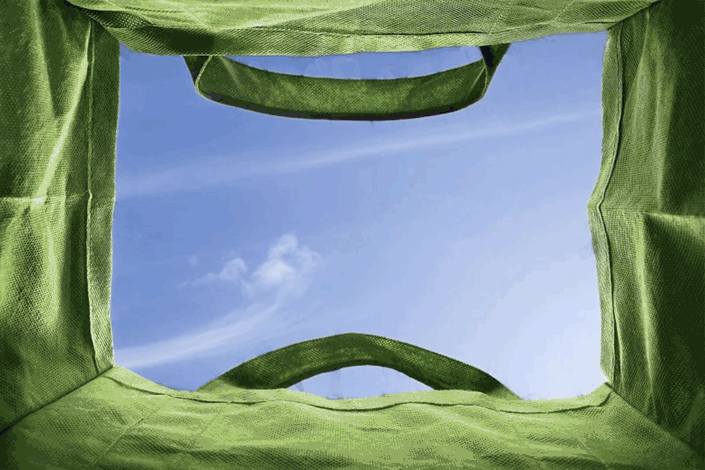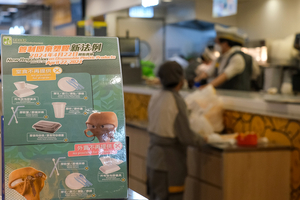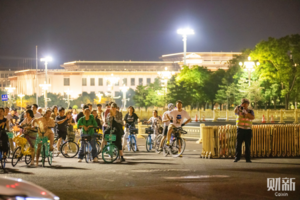In Depth: China’s Popular Plastic Bag Replacement Is Less Green Than It Seems
Listen to the full version

Li Jingjing is a firm believer in making use of whatever’s around her. She’s repurposed glass bottles into small lamps, cups, and tea canisters. She’s transformed key chains into handy pill boxes, and turned leftover crab shells into a collage of a fox.
But she’s still not sure how to deal with her hoard of nonwoven bags.
Because of her busy work schedule, Li usually gets her groceries delivered by online platforms like Freshippo, Dingdong Maicai and Meituan Maicai. With each purchase, she receives one or two nonwoven bags. She soon found herself with more than 200 at home.

Download our app to receive breaking news alerts and read the news on the go.
Get our weekly free Must-Read newsletter.
- DIGEST HUB
- Li Jingjing creatively repurposes household items but struggles with an excess of nonwoven bags from grocery deliveries.
- Nonwoven bags, often misleadingly marketed as eco-friendly, require significant reuse to offset their environmental impact.
- China's measures against single-use plastic bags led to the rise of nonwoven bags, though critics argue true environmental benefits come from reducing waste generation and enhancing reuse.
Li Jingjing enjoys repurposing various objects, converting glass bottles into lamps and cups, key chains into pill boxes, and crab shells into a fox collage [para. 1]. However, she finds it challenging to reuse her collection of over 200 nonwoven bags, accumulated through frequent online grocery shopping from platforms like Freshippo and Dingdong Maicai [para. 2][para. 3]. She shared her dilemma on social media, generating hundreds of comments and revealing a widespread issue of nonwoven bags being too numerous to manage yet too durable to discard [para. 4][para. 5].
Nonwoven bags, often mistaken for cloth but typically made from plastic fibers, became popular following regulations limiting single-use plastic bags [para. 6]. These regulations aimed to reduce plastic waste as single-use plastic bags can persist for up to 400 years without decomposing and were used excessively in China, with an average of 1,095 bags per person annually [para. 9][para. 11]. A 2007 notice from the State Council restricted the production and use of thin plastic bags, but their usage continued to rise, leading to further regulations in 2020 banning non-degradable single-use plastic bags in major cities [para. 12].
Despite the promotion of eco-friendly alternatives like cloth and paper bags, these options failed to gain popularity due to perceptions of high costs and poor quality [para. 13]. Consequently, nonwoven bags emerged as a replacement, despite not being classified as eco-friendly or banned [para. 14].
Businesses often promote nonwoven bags as "eco-friendly" despite their plastic composition. A survey by Plastic Free China revealed that only 10% of respondents knew these bags are made from plastic, with many mistaking them for natural materials like cotton and hemp [para. 16]. The green marketing is partially justified by their durability compared to single-use plastic bags [para. 17]. However, a U.K. Environment Agency report stated that nonwoven bags need to be reused at least 11 times to offset their production's greater environmental impact [para. 18]. If discarded after one use, a single nonwoven bag consumes 17.8 times more energy and emits 16.7 times more carbon than a disposable plastic bag [para. 19]. Furthermore, nonwoven bags are becoming thinner and more akin to disposable items as businesses attempt to reduce costs [para. 20]. A survey in Hainan indicated that most consumers do not reuse these bags due to their small size and poor quality, and they often leak when used as garbage bags [para. 21].
Environmental scientists argue for focusing on reducing the production of plastic waste and emphasize the importance of actual reuse over merely substituting one plastic product for another [para. 23]. Recycling and reuse should follow waste generation, with incineration for energy recovery as a secondary option and landfilling as a last resort [para. 24]. The burgeoning food delivery industry in China is also addressing plastic use, with initiatives like Meituan's Blue Mountain Project, launched in 2017 [para. 26]. This project has encouraged over 410 million customers to opt out of receiving cutlery, leading to a 63% execution rate of such orders in 2023 [para. 27], demonstrating steps towards reducing plastic waste in food delivery packaging.
Contact reporter Guo Xin at xinguo@caixin.com and editor Joshua Dummer at joshuadummer@caixin.com for more information [para. 28].
- Freshippo
- Freshippo is an online platform where Li Jingjing usually gets her groceries delivered. As part of each purchase, she receives nonwoven bags, contributing to her accumulation of more than 200 bags at home. This reflects a broader issue of these supposedly eco-friendly bags piling up in homes while being seen as too sturdy to discard easily.
- Dingdong Maicai
- Dingdong Maicai is an online platform used by Li Jingjing to get her groceries delivered. Each purchase from such platforms typically comes with one or two nonwoven bags. These bags have accumulated in her home, contributing to her hoard of over 200 bags, highlighting a dilemma faced by many consumers who find these bags to be too sturdy to simply discard.
- Meituan Maicai
- Meituan Maicai is an online grocery delivery platform frequently used by Li Jingjing due to her busy work schedule. It delivers groceries in nonwoven bags which have accumulated in her home. As part of the food delivery giant Meituan, it is also involved in environmental initiatives like the Blue Mountain Project to reduce plastic use, offering options like "no cutlery" to its users.
- 2007:
- A notice issued by the State Council outlined strict measures to limit the use of single-use plastic bags, prohibiting the production, sale, and use of plastic shopping bags with a thickness of less than 0.025 millimeters.
- 2011:
- A report by the U.K. Environment Agency assessed the life cycles of seven commonly used types of shopping bags, finding that nonwoven bags need to be reused at least 11 times to be more environmentally beneficial than using a single-use plastic bag once.
- 2017:
- Meituan launched the Blue Mountain Project to protect the environment and began offering consumers the option to choose 'no cutlery.'
- 2020:
- China introduced a policy to clamp down on disposable plastic bags, banning non-degradable single-use plastic bags in shopping malls, supermarkets, and fresh produce platforms in first- and second-tier cities.
- By 2023:
- The actual execution rate of 'no cutlery' orders on Meituan was about 63%.
- GALLERY
- PODCAST
- MOST POPULAR







 Sign in with Google
Sign in with Google
 Sign in with Facebook
Sign in with Facebook
 Sign in with 财新
Sign in with 财新